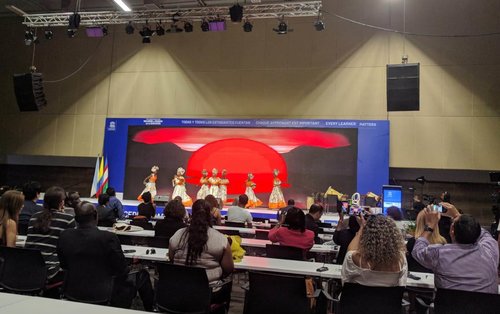
Inclusion in Education, from Salamanca to Cali—and Beyond
27 سبتمبر 19
This September, we were invited to attend the International Forum on Inclusion and Equity in Education in Cali, Colombia. This Forum celebrated the 25th anniversary of the 1994 World Conference on Special Needs Education in Salamanca, Spain, where representatives of 92 governments and 25 INGOs called for a paradigm shift in addressing special needs in education.
The Cali Forum was an opportunity to review progress since 1994 and to set the tone for another 25 years of gains in inclusive education. It was co-hosted by UNESCO and the Colombian Ministry of Education, with support from Open Society Foundations. A sponsor of both the Forum and of RTI’s Baytna program, OSF invited us to attend and showcase Baytna as an effective and innovative method to deliver inclusive early childhood development (ECD) programming.
What is Inclusive Education?
At a theoretical level, inclusive education is built around the premise that every child has the same right to open, equitable, and high-quality education—especially children with special needs. At a more practical level, inclusive education is also built around an understanding that it is less costly and more productive to educate children with special needs in an open schooling model, alongside other children their age, than to educate them in separate facilities. Bridging idealism and pragmatism, the inclusive education model advocates for schools and school systems to adapt their infrastructure and curricula to make their schools accessible to all children.
This begins with building wheelchair ramps and accessible bathrooms, for example, but it extends far beyond upgrading physical infrastructure. It continues with acquiring school books in Braille and hiring teachers who know sign language, but also extends beyond acquiring needs-specific material and specialized personnel. It extends to the conceptual level: to transitioning from testing students against rigid metrics, to using more holistic methods to measure children’s development.
In addition to reflecting on progress, the Cali Forum also signaled how the collective understanding of inclusive education is evolving. If, 25 years ago, governments and NGOs convened a conference on special needs education, the 2019 Forum centered on inclusion. The 2019 Forum focused not only the challenge of delivering education to children with special needs, but also of adapting educational systems to children whose needs are the product of external circumstances—for example, those displaced by conflict, poverty, or climate change.
Displacement and Inclusive Education
Over the last decade, displacement and forced migration have increased dramatically around the world. As a result, millions of children whose education has been interrupted have to make great efforts to integrate into new school systems, adapting to different approaches, different customs, often even to different languages. Children who have experienced toxic stress face extra barriers: the need to overcome the resulting trauma before they can begin learning again.
With over 70 million displaced people worldwide, the need for sustainable models to integrate displaced children into local school systems is not an abstract utopia but an immediate and urgent priority. Fortunately, the inclusive education models developed over the last 25 years are more than up to this challenge.
At RTI we believe that inclusion plays a crucial role in mitigating the effects of displacement, and we are committed to building early childhood development models that, in the long run, benefit both displaced and host communities. Indeed, the trauma-sensitive, identity-informed principles we used to develop Baytna rest on the same intuition that animated the Inclusion Forum.
Baytna is inclusive of children whose special needs are invisible, but nonetheless daunting. Baytna is built around spaces designed to be welcoming and healing—read: inclusive—and around the efforts of facilitators to identify and mediate the challenges that displaced children and their families face. By offering activities that are playful, that train children’s curiosity and encourage them to expand their imagination, Baytna creates a medium where all children can feel safe and welcome, and helps them learn to take initiative, regulate their emotions, and become resilient.
Baytna is inclusive of caregivers as well, who are invited to join activities, as participants or as supervisors. This process supports learning and growth for both caregivers and facilitators, as it enables them to share knowledge about children’s development, through both observation and active engagement. It brings together theoretical knowledge, maternal instinct, culturally relevant practice, family insight, and many more lines of intuition into building a truly protective space around the children attending Baytna.
By helping displaced children and their families develop psychological hygiene and build up resilience, Baytna helps them access their host communities from a place of safety and balance. Effectively, Baytna helps displaced families become agents advancing their own inclusion into local communities and helps children become agents advancing their own inclusion into local schools.
Every child deserves nurturing care. Every child deserves high-quality, inclusive early childhood development support. As we consolidate and expand Baytna, we are eager to take on the challenge of continuing to support families with inclusive early childhood development programming. As UNESCO, OSF, and other sponsors and participants of the Inclusion Forum continue working toward greater inclusion, we are just as eager to contribute to the next 25 years of progress in inclusive education.

